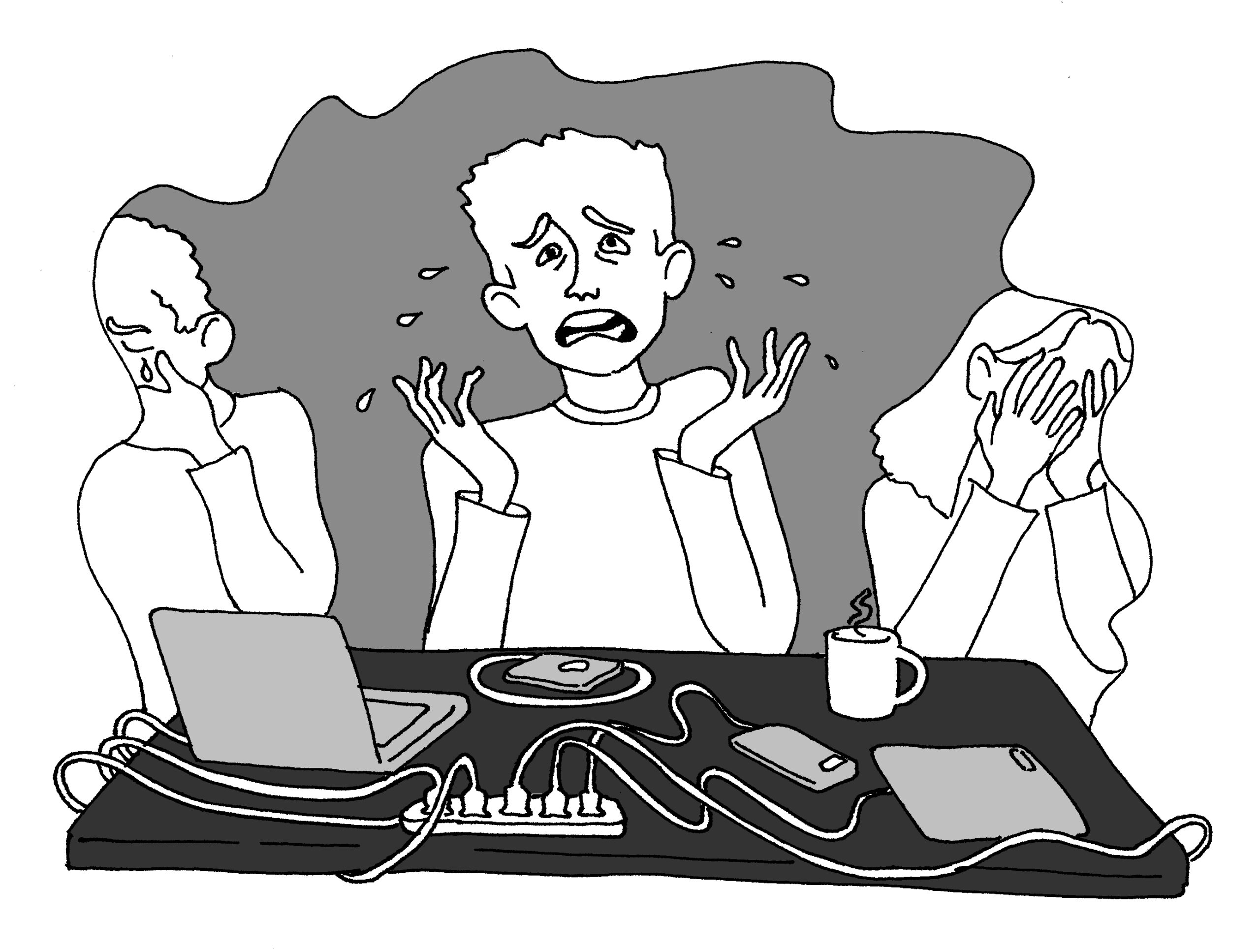Post-storm reflections: power outages can be more than inconveniences
November 3, 2017
 This
piece represents the opinion of the author
.
This
piece represents the opinion of the author
.
I had a fun-packed Family Weekend at Bowdoin with my friends and family, but everything changed when the storm unleashed its wrath on Bowdoin’s campus. On Monday morning, October 30, I woke up to rain showers of epic proportions and winds that could lift one off the ground. Soon thereafter, I checked my email and learned that my meeting at 8:30 a.m. was cancelled and that there was a power outage throughout campus.
At first, leaving my dorm and walking through the storm felt like a treacherous voyage, but I felt solidarity with my Bowdoin peers. Some of us dared to have breakfast at Moulton and “do it in the dark.” Most of us ate lunch at Thorne Hall, which was riddled with folding tables, laptop chargers and power strips. Throughout the day, we struggled to acquire “scarce resources” like Wi-Fi and power outlets. My friends braved the harsh winds to reach Thorne, our temporary “disaster relief center,” which connected us back to the important things in life, email and Netflix. We all shuddered at the idea of taking cold water showers once the warm water ran out.
“If I were a first year, I would transfer,” said a disgruntled senior at Thorne. “My professor refuses to cancel class, and here I am trying to find an outlet,” said virtually everyone I met who had an 11:30 a.m. class. Most of my friends would just look at me, shake their heads, and walk away in utter frustration. The saddest part of the storm’s aftermath was that the winds had uprooted a number of Bowdoin’s beloved trees. According to my Instagram feed, the upended trees at least made great backdrops for portraits. “When I see fallen trees, I think of dead bodies,” my mother remarked rather bleakly, as she watched onlookers gazing at these giant tree corpses in awe.
At the end of the day, I rushed to stores in hopes of purchasing lights for my room, only to find out that Hannaford ran out of candles and Walmart’s portable lamp supply had been emptied. To make matters worse, I made the mistake of not going to Thorne dinner as soon as it opened. At 6:30 p.m., what awaited me were hundreds of students littered about. It took me nearly ten minutes to find a place to sit and the serving lines were about as long as those at Bowdoin’s Thanksgiving dinner. Around seven o’clock, I was getting a cup of tea when I heard a huge roar of excitement from the Thorne crowd. At first I thought this was a sign that the power had returned, but alas, they were just cheers at the announcement that Thorne would be open until midnight. It certainly was kind of Bowdoin to make the dining hall an impromptu study space, but I thought this outage would finally force my community to relax. After seeing some students hog the power sockets for mindless net surfing and Netflix binging, I realized that not everyone felt the same sense of solidarity in the post-storm crisis as I did.
My Monday night consisted of hopeless attempts to do my readings as I sat across the table from my mother, who was visiting for Family Weekend, but couldn’t travel back home due to the inclement weather that morning. Thorne was a terrible place to study. It was far more crowded than any of the other study areas I usually inhabit.
While this post-storm experience was a stressful one, it pales in comparison to some of the natural disasters that have occurred and have been occurring across the globe. Bowdoin students all had access to running water and food, thanks to the wonderful efforts of our dining staff. As far as I’m aware of, no Bowdoin students or professors were injured in the aftermath of the storm, and no trees landed on any buildings. Most of us were mildly inconvenienced, and we overcame the obstacles unscathed.
The day before Brunswick’s power outage was the fifth anniversary of Hurricane Sandy, a superstorm that hit my home state of New Jersey pretty hard. I remember being one of few students in my high school with power, and opening my home to my younger cousin when his family’s house was too cold to live in during the storm. I missed two whole weeks of school because of a hurricane that was swallowing up homes and tragically taking lives. Today, over a month after Hurricanes Irma and Maria, there are still families in Puerto Rico running out of clean water and food supplies, and hospitals barely functioning in the current state of conditions. The latest natural disasters have destroyed or damaged thousands of homes, but more importantly, have claimed many lives. The death toll from these disasters is rising due to the depletion of life-saving hospital equipment.
I deeply appreciated my professor’s e-mail to my Africana Studies class that began with, “First and foremost: I hope you are well.” Sometimes, Bowdoin gets too focused on the inconveniences and fails to consider what they should be grateful for. At times like this, I think about those with harsher post-storm conditions, while I still have the bare necessities. In the wise words of my three-year old self giving up in trying to find my lost toy car, “look at it this way, Mommy: at least I still have my life.”


Comments
Before submitting a comment, please review our comment policy. Some key points from the policy: